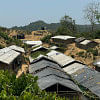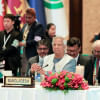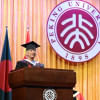Yunus urges BIMSTEC to act on Rohingya crisis

Chief Adviser Prof Muhammad Yunus has said BIMSTEC should take more visible actions to engage Myanmar to bring stability in Rakhine for an enabling environment for return of the Rohingyas sheltered in Bangladesh.
Addressing the sixth BIMSTEC summit in Bangkok today morning, he said BIMSTEC can promote dialogue to resolve the internal conflicts, particularly between the conflicting parties in Rakhine.
Leaders of the seven BIMSTEC member countries, including Indian Prime Minister Narendra Modi and Myanmar Senior General Min Aung Hlaing were present.
The leaders observed a minute of silence for the victims of recent earthquakes in Myanmar and Thailand ahead of the summit.
"Given the recent developments in Rakhaine State, amidst the warning of UNDP of an impending famine in Rakhaine, a humanitarian channel in Rakhine may be established for the supply of basic necessities to the people to stop further displacement from Rakhine," Prof Yunus said.
Bangladesh shelters 1.2 million Roingya, mostly the ones who fled military crackdown in Rakhine State in 2017. With the military takeover in 2021, Myanmar witnessed a civil war and the rebel group Arakan Army in Rakhine has taken control of about 90 percent of the state.
There is a looming humanitarian crisis, which has worsened with last week's devastating earthquake in Myanmar.
"The protracted Rohingya crisis, if unresolved, has the possibility to create instability in the whole region," said Prof Yunus.
He said Bangladesh encourages meaningful political participation of BIMSTEC member states in the "High-Level Conference on the Situation of Rohingya Muslims and Other Minorities in Myanmar" under the UN auspices, in September 2025.
Prof Yunus has also called upon all BIMSTEC leaders to extend their valued support in redeeming the collective commitments to revitalise BIMSTEC as Bangladesh assumes the BIMSTEC chairmanship today for the next two years.
"BIMSTEC has been in existence for 28 long years. To be candid, its impacts are not still felt across the member states and beyond," he said.
Signing and ratification of the Charter and formulation of the relevant Rules of Procedure has accorded the BIMSTEC processes and institutions considerable strength, he said.
"Our civil society and private sector particularly stress on BIMSTEC to take up tangible and result-oriented initiatives, and projects amongst our countries."
"We need a genuinely shared sense of mutual confidence and mutuality of interests, rising above our differences and divergences. Whatever we undertake or do collectively, we need to be driven by impact and results.
"Approaching the fourth decade, we need to re-discover the modalities and institutions of regional and sub-regional collaboration under BIMSTEC."
Prof Yunus said addressing inequality of income and choices, balancing economy and ecology need to be overriding objectives in pursuing our sectoral cooperation.
"While each of our countries pursue our national interests, we also need to appreciate the same of 'others' in the table in shaping and moving our wider cooperative agenda," he said.
He said within and beyond the region, resources - capacities - solutions abound to address many of our endemic challenges, like climate change.
"As much as we facilitate knowledge and technology amongst our seven countries, let us also open up to the world – the governments, the knowledge institutions, foundations, private sector – who would share our values and appreciate our needs."
Prof Yunus also described how the interim government was formed following a mass upsurge and then he was made the chief adviser and the reforms this government has undertaken.'
He affirmed the BIMSTEC leaders that holding the national elections of Bangladesh at the earliest possible is at the top of our agenda.
"I have assured our people that, once our mandate is fulfilled in the conduct of elections as well as the required reform is done, we shall hold a free, fair and participatory election.
"As we rebuild Bangladesh, we will continue to work steadfastly to ensure the constitutional rights of every citizen of the country whether they are women or members of ethnic and religious minorities."

 For all latest news, follow The Daily Star's Google News channel.
For all latest news, follow The Daily Star's Google News channel. 







Comments